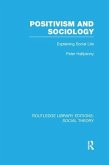After Positivism
New Approaches to Comparison in Historical Sociology
Herausgeber: Mayrl, Damon; Wilson, Nicholas Hoover
After Positivism
New Approaches to Comparison in Historical Sociology
Herausgeber: Mayrl, Damon; Wilson, Nicholas Hoover
- Broschiertes Buch
- Merkliste
- Auf die Merkliste
- Bewerten Bewerten
- Teilen
- Produkt teilen
- Produkterinnerung
- Produkterinnerung
This book presents a wide array of warrants and methodologies for comparison to improve explanations of historical change in social-scientific research.
Andere Kunden interessierten sich auch für
![Positivism and Sociology Positivism and Sociology]() Peter HalfpennyPositivism and Sociology62,99 €
Peter HalfpennyPositivism and Sociology62,99 €![Odd Girls and Twilight Lovers Odd Girls and Twilight Lovers]() Lillian FadermanOdd Girls and Twilight Lovers20,99 €
Lillian FadermanOdd Girls and Twilight Lovers20,99 €![Hidden Hate Hidden Hate]() Mathew CreightonHidden Hate33,99 €
Mathew CreightonHidden Hate33,99 €![Where Men Hide Where Men Hide]() James B TwitchellWhere Men Hide22,99 €
James B TwitchellWhere Men Hide22,99 €![The Long Arc of Justice The Long Arc of Justice]() Richard MohrThe Long Arc of Justice20,99 €
Richard MohrThe Long Arc of Justice20,99 €![Families We Choose Families We Choose]() Kath WestonFamilies We Choose22,99 €
Kath WestonFamilies We Choose22,99 €![Equal Opportunities for Women and Men: Monitoring Law and Practice in New Member States and Accession Countries of the European Union [With CDROM] Equal Opportunities for Women and Men: Monitoring Law and Practice in New Member States and Accession Countries of the European Union [With CDROM]]() Equal Opportunities for Women and Men: Monitoring Law and Practice in New Member States and Accession Countries of the European Union [With CDROM]32,99 €
Equal Opportunities for Women and Men: Monitoring Law and Practice in New Member States and Accession Countries of the European Union [With CDROM]32,99 €-
-
-
This book presents a wide array of warrants and methodologies for comparison to improve explanations of historical change in social-scientific research.
Hinweis: Dieser Artikel kann nur an eine deutsche Lieferadresse ausgeliefert werden.
Hinweis: Dieser Artikel kann nur an eine deutsche Lieferadresse ausgeliefert werden.
Produktdetails
- Produktdetails
- Verlag: Columbia University Press
- Seitenzahl: 384
- Erscheinungstermin: 30. April 2024
- Englisch
- Abmessung: 230mm x 155mm x 25mm
- Gewicht: 498g
- ISBN-13: 9780231208239
- ISBN-10: 0231208235
- Artikelnr.: 69187032
- Herstellerkennzeichnung
- Libri GmbH
- Europaallee 1
- 36244 Bad Hersfeld
- gpsr@libri.de
- Verlag: Columbia University Press
- Seitenzahl: 384
- Erscheinungstermin: 30. April 2024
- Englisch
- Abmessung: 230mm x 155mm x 25mm
- Gewicht: 498g
- ISBN-13: 9780231208239
- ISBN-10: 0231208235
- Artikelnr.: 69187032
- Herstellerkennzeichnung
- Libri GmbH
- Europaallee 1
- 36244 Bad Hersfeld
- gpsr@libri.de
Nicholas Hoover Wilson is associate professor of sociology at Stony Brook University. He is the author of Modernity's Corruption: Empire and Morality in the Making of British India (Columbia, 2023). Damon Mayrl is associate professor of sociology at Colby College. He is the author of Secular Conversions: Political Institutions and Religious Education in the United States and Australia, 1800-2000 (2016).
Acknowledgments
Comparison After Positivism, by Damon Mayrl and Nicholas Hoover Wilson
Part I. Why Compare?
1. The Qualitative-Quantitative Divide in Comparative Historical Analysis,
by Stefan Bargheer
2. Comparison in Action: Immersion and Recursion as Heuristics in
Historical Sociology, by Damon Mayrl
3. The Meaningfulness of Comparison: A Macro-Phenomenological Exploration,
by Xiaohong Xu
4. From Causality to Constitution: Why Good Historical Comparisons Are the
Same as Good Ethnographic Case Studies, Deep Down, by Josh Pacewicz
Part II. What to Compare
5. Process Theories and Comparative Sociology: Some Problems and a
Solution, by Natalie B. Aviles
6. Designing Narratives and Recovering Legal Narrativity: An Exploratory
Essay, by Laura R. Ford
7. Comparison, Context, and the Power of Modern Corruption, by Nicholas
Hoover Wilson
Part III. How to Compare
8. Comparative Sociology, Critical Realism, and Reflexivity, by George
Steinmetz
9. Historicizing Comparisons in Historical Sociology, by Jonah Stuart
Brundage
10. How Not to Lie with Comparative Historical Sociology: A Realist Balance
Sheet, by Simeon J. Newman
11. Historical Causation and Temporally Sensitive Comparisons, by Yang
Zhang
12. The Dialectical Comparative Methodology, by Rebecca Jean Emigh, Dylan
Riley, and Patricia Ahmed
Afterword, by Philip Gorski
Contributors
Index
Comparison After Positivism, by Damon Mayrl and Nicholas Hoover Wilson
Part I. Why Compare?
1. The Qualitative-Quantitative Divide in Comparative Historical Analysis,
by Stefan Bargheer
2. Comparison in Action: Immersion and Recursion as Heuristics in
Historical Sociology, by Damon Mayrl
3. The Meaningfulness of Comparison: A Macro-Phenomenological Exploration,
by Xiaohong Xu
4. From Causality to Constitution: Why Good Historical Comparisons Are the
Same as Good Ethnographic Case Studies, Deep Down, by Josh Pacewicz
Part II. What to Compare
5. Process Theories and Comparative Sociology: Some Problems and a
Solution, by Natalie B. Aviles
6. Designing Narratives and Recovering Legal Narrativity: An Exploratory
Essay, by Laura R. Ford
7. Comparison, Context, and the Power of Modern Corruption, by Nicholas
Hoover Wilson
Part III. How to Compare
8. Comparative Sociology, Critical Realism, and Reflexivity, by George
Steinmetz
9. Historicizing Comparisons in Historical Sociology, by Jonah Stuart
Brundage
10. How Not to Lie with Comparative Historical Sociology: A Realist Balance
Sheet, by Simeon J. Newman
11. Historical Causation and Temporally Sensitive Comparisons, by Yang
Zhang
12. The Dialectical Comparative Methodology, by Rebecca Jean Emigh, Dylan
Riley, and Patricia Ahmed
Afterword, by Philip Gorski
Contributors
Index
Acknowledgments
Comparison After Positivism, by Damon Mayrl and Nicholas Hoover Wilson
Part I. Why Compare?
1. The Qualitative-Quantitative Divide in Comparative Historical Analysis,
by Stefan Bargheer
2. Comparison in Action: Immersion and Recursion as Heuristics in
Historical Sociology, by Damon Mayrl
3. The Meaningfulness of Comparison: A Macro-Phenomenological Exploration,
by Xiaohong Xu
4. From Causality to Constitution: Why Good Historical Comparisons Are the
Same as Good Ethnographic Case Studies, Deep Down, by Josh Pacewicz
Part II. What to Compare
5. Process Theories and Comparative Sociology: Some Problems and a
Solution, by Natalie B. Aviles
6. Designing Narratives and Recovering Legal Narrativity: An Exploratory
Essay, by Laura R. Ford
7. Comparison, Context, and the Power of Modern Corruption, by Nicholas
Hoover Wilson
Part III. How to Compare
8. Comparative Sociology, Critical Realism, and Reflexivity, by George
Steinmetz
9. Historicizing Comparisons in Historical Sociology, by Jonah Stuart
Brundage
10. How Not to Lie with Comparative Historical Sociology: A Realist Balance
Sheet, by Simeon J. Newman
11. Historical Causation and Temporally Sensitive Comparisons, by Yang
Zhang
12. The Dialectical Comparative Methodology, by Rebecca Jean Emigh, Dylan
Riley, and Patricia Ahmed
Afterword, by Philip Gorski
Contributors
Index
Comparison After Positivism, by Damon Mayrl and Nicholas Hoover Wilson
Part I. Why Compare?
1. The Qualitative-Quantitative Divide in Comparative Historical Analysis,
by Stefan Bargheer
2. Comparison in Action: Immersion and Recursion as Heuristics in
Historical Sociology, by Damon Mayrl
3. The Meaningfulness of Comparison: A Macro-Phenomenological Exploration,
by Xiaohong Xu
4. From Causality to Constitution: Why Good Historical Comparisons Are the
Same as Good Ethnographic Case Studies, Deep Down, by Josh Pacewicz
Part II. What to Compare
5. Process Theories and Comparative Sociology: Some Problems and a
Solution, by Natalie B. Aviles
6. Designing Narratives and Recovering Legal Narrativity: An Exploratory
Essay, by Laura R. Ford
7. Comparison, Context, and the Power of Modern Corruption, by Nicholas
Hoover Wilson
Part III. How to Compare
8. Comparative Sociology, Critical Realism, and Reflexivity, by George
Steinmetz
9. Historicizing Comparisons in Historical Sociology, by Jonah Stuart
Brundage
10. How Not to Lie with Comparative Historical Sociology: A Realist Balance
Sheet, by Simeon J. Newman
11. Historical Causation and Temporally Sensitive Comparisons, by Yang
Zhang
12. The Dialectical Comparative Methodology, by Rebecca Jean Emigh, Dylan
Riley, and Patricia Ahmed
Afterword, by Philip Gorski
Contributors
Index








![Equal Opportunities for Women and Men: Monitoring Law and Practice in New Member States and Accession Countries of the European Union [With CDROM] Equal Opportunities for Women and Men: Monitoring Law and Practice in New Member States and Accession Countries of the European Union [With CDROM]](https://bilder.buecher.de/produkte/59/59810/59810559m.jpg)